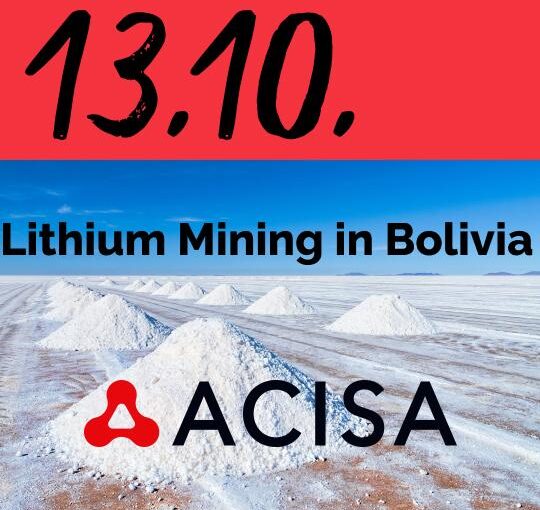+++DE & ES below+++
Lithium is essential for producing batteries and therefore for all capitalist plans of transitioning to “green” energy. To produce lithium, gigantic amounts of water are pumped out from below salt flats and left to dry on the surface, with toxins leaking into the environment (killing fish, birds, cattle and entire ecosystems) and using up scarce water resources. Bolivia has some of the largest lithium resources and is currently renegotiating lithium extraction with multinational corporations as well as meeting with the German government to discuss their interest in lithium. The German company ACISA was operating mines in Uyuni before but stopped extracting lithium in 2019 due to successful resistance from local Aymara and Quechua communities many of whom live off the salt flats as salt sellers and would lose their livelihood as mining destroys the salt flats.
Lithium ist für die Herstellung von Batterien und damit für alle kapitalistischen Pläne des Übergangs zu “grüner” Energie unerlässlich. Zur Gewinnung von Lithium werden gigantische Mengen Wasser aus Salinen gepumpt und an der Oberfläche getrocknet, wobei Giftstoffe in die Umwelt gelangen (die Fische, Vögel, Rinder und ganze Ökosysteme töten) und knappe Wasserressourcen verbrauchen. Bolivien verfügt über eines der größten Lithiumvorkommen und verhandelt derzeit mit multinationalen Unternehmen über den Lithiumabbau. Dazu gehört auch die Bundesregierung, die sich mit der bolivianischen Regierung getroffen hat um ihr Interesse an Lithiumgewinnung zu verfestigen. Das deutsche Unternehmen ACISA hat bereits Minen in Uyuni betrieben, den Lithiumabbau aber 2019 aufgrund des erfolgreichen Widerstands der lokalen Aymara und Quechua communities eingestellt, von denen viele durch Salzverkauf von den Salinen leben und ihre Lebensgrundlage verlieren würden, da der Abbau die Salinen zerstört.
El litio es esencial para producir baterías y, por lo tanto, también indispensable para los planes capitalistas de transición a la energía “verde”. Para producir litio, se extraen enormes cantidades de agua de debajo de los salares y se dejan secar en la superficie, con lo que se filtran toxinas al medio ambiente (matando así peces, aves, ganado y ecosistemas enteros) y se agotan los escasos recursos hídricos. Bolivia posee algunos de los mayores recursos de litio del mundo y actualmente está renegociando la extracción de este metal con empresas multinacionales, además de reunirse con el gobierno alemán para abordar este tema. La empresa alemana ACISA explotaba minas en Uyuni anteriormente, pero dejó de extraer litio en 2019 gracias a la oposición y resistencia de las comunidades aymara y quechua de la región. Muchas personas se dedican a la venta de sal y perderían su medio de vida si la minería destruyera las salinas.
Sources:
https://news.mongabay.com/2022/12/five-pressing-questions-for-the-future-of-lithium-mining-in-bolivia/
https://news.climate.columbia.edu/2023/01/18/the-paradox-of-lithium/
https://news.climate.columbia.edu/2021/06/09/stop-calling-green-energy-clean/
https://wellcomecollection.org/articles/YTdnPhIAACIAGuF3
https://www.instituteforenergyresearch.org/renewable/the-environmental-impact-of-lithium-batteries/
